Mooncakes Are Just the Beginning: 14 Recipes for the Mid-Autumn Festival
Cookbook author Betty Liu reflects on food, family-style, in celebration of home and harvest

1_nude / Getty Images
My most vivid memory of celebrating the Mid-Autumn Festival isn’t devouring mooncakes but reciting a poem: Li Bai’s “Quiet Night Thought” (静夜思, Jìng yè sī). It was an exercise for Chinese school; our class would recite the famous Tang-era poem in an assembly celebrating the holiday with all our families in the audience. The poem was chosen for its reverence for the full moon (a symbol of reunion) and for the speaker’s longing for family and home — all reflecting the values of the holiday. “I lift my head to gaze at the bright moon / I lower my head, nostalgic for my home.”
The Mid-Autumn Festival (中秋节, zhōng qiū jié) falls on the 15th day of the eighth month of the lunar calendar, on a night with a full moon. This year, it falls on September 17, 2024. The most recognized food associated with this holiday is the mooncake: a round, circular treat encased in a rich pastry dough and filled with anything from lotus paste, red bean paste, and salted yolks to pickles and savory pork. These treats, round to resemble the moon, are a symbol of family, reunion, love, and celebration. Step into any Asian supermarket in the weeks preceding the Mid-Autumn Festival and you’ll see elaborately decorated tins of mooncakes ready for gift-giving. Sometimes they even come with a matching gift bag with handles! The act of giving mooncakes is itself a gesture of well wishes and prosperity.
The real star of this holiday, however, is not the mooncake, but the reunion meal. In fact, the day is sometimes called the Family Reunion Festival. Traditionally it coincided with the end of the harvest, and the meal would reflect this: a celebration of a season of both hard work and abundance, all under the glow of the bright, full moon with family and friends. Besides mooncakes, there aren’t really specific dishes for this holiday (unlike for Lunar New Year, which features many symbolic foods). That’s because this festival is more about acts and practices than any particular recipe: moon-gazing, celebrating the bountiful harvest, family reunions, sharing a meal with those closest to you, hanging lanterns, and gifting mooncakes.
A typical table for the Mid-Autumn Festival highlights the local harvest. In China, foods such as pear, lotus root, squash, taro, mushroom, and crab are traditionally included because they are in season there. The classic dishes found in any Chinese feast also make an appearance: whole fish, duck, and pork belly. Today this festival is celebrated all over the world. What’s abundant in the local harvest where I am in New England, for example, isn’t going to be what is available in China at this time. Food is, after all, a reflection of time and place. I encourage you to turn to your local crop and see what’s available and in season. Don’t be bound by convention and make only traditional recipes – focus instead on reuniting with friends and family, and admiring the beautiful full moon!
Miso Braised Eggs with Shallots

Food & Wine / Photo by Jen Causey / Food Styling by Margaret Monroe Dickey / Prop Styling by Jillian Knox
Inspired by the eggs included with Chinese red-braised pork belly, hard-boiled eggs are simmered in a sweet and tangy miso-spiked braising liquid. Serve it with rice to sop up the rich miso and vinegar sauce.
Pearl Balls
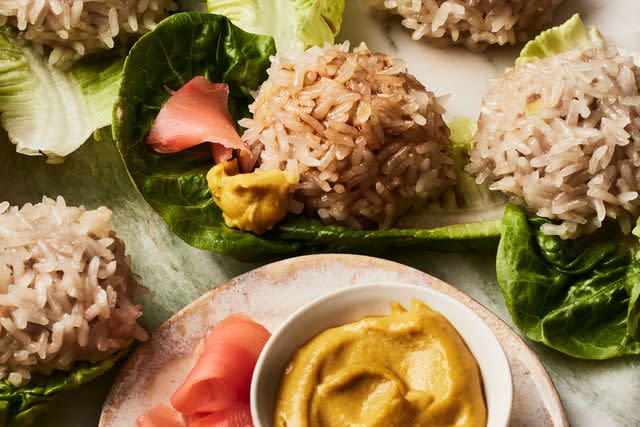
Greg Dupree / Food Styling by Margaret Monroe Dickey / Prop Styling by Thom Driver
Bite-size meatballs are rolled in sticky rice then steamed to perfection in this traditional Chinese dish, often served at Lunar New Year as well as the Mid-Autumn Festival. This version calls for juicy pork, leek, and ginger in the meatballs; it is served with soy sauce, pickled ginger, rehydrated Chinese mustard powder, and romaine lettuce leaves for plenty of flavor.
Tea-Brined Duck

Food & Wine / Photo by Jen Causey / Food Styling by Margaret Monroe Dickey / Prop Styling by Jillian Knox
A strong brine of black tea steeped with cloves, Chinese five spice powder, star anise, and cinnamon permeates duck breast that is quickly seared in a pan. Serve it with bao buns or Mandarin pancakes, just as you would Peking Duck.
Braised Soy Sauce Chicken
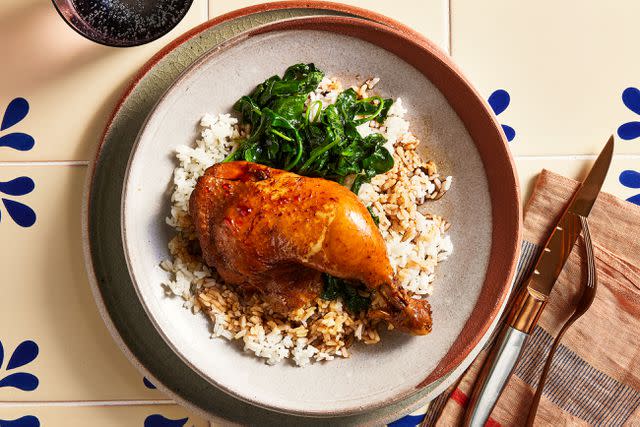
Jennifer Causey / Food Styling by Chelsea Zimmer / Prop Styling by Claire Spollen
Braising chicken legs in soy sauce, dark soy sauce, star anise, scallions, and Shaoxing rice wine creates meat that is juicy, tender, and flavorful. Be sure to keep the skin on the chicken, as it not only helps create a beautiful presentation but also provides extra flavor to the broth.
Chicken and Chestnut Soup
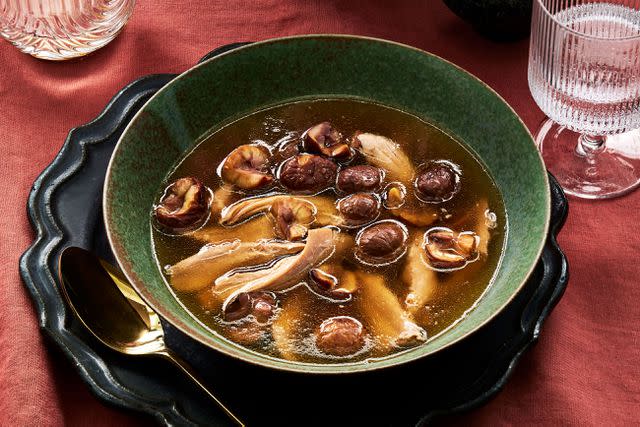
Victor Protasio / Food Styling by Chelsea Zimmer / Prop Styling by Christine Keely
Slow-cooked chicken thighs simmer alongside black cardamom pods and Chinese chestnuts in this classic Chinese soup. Serve as a first course or appetizer.
Vegetable Hot and Sour Soup
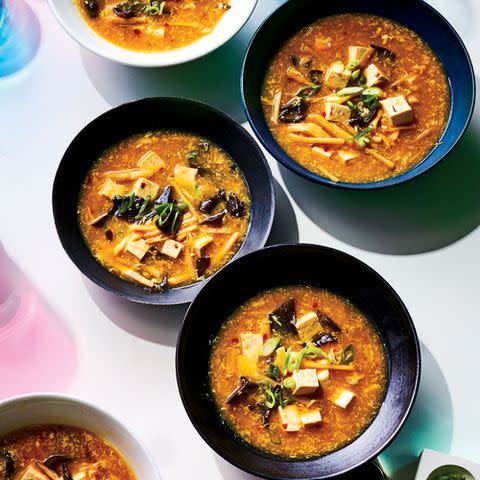
Dried lily buds, also called tiger lily buds or golden needles, are rehydrated alongside tree ear, or wood ear, mushrooms to add traditional flavor and texture to this soup. In a pinch, you can use dried shiitakes and skip the dried lily buds.
Roasted Butternut Squash with Curry Leaves
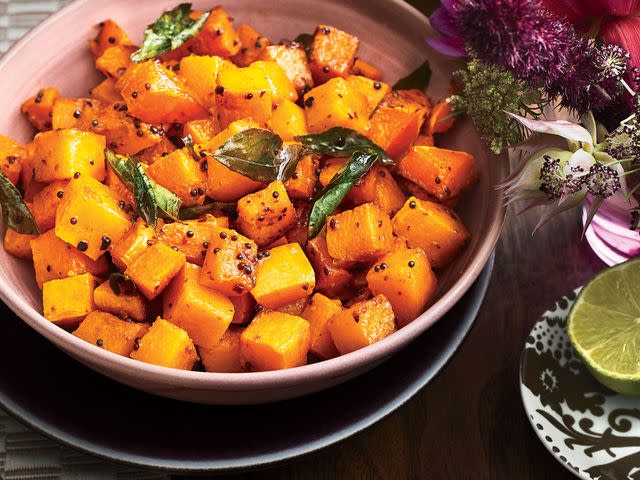
Though not a traditional Chinese recipe, this dish is a welcome addition to a Mid-Autumn Festival table to highlight fall squash. Black mustard seeds, marash chile flakes, and curry leaves give roasted butternut squash aromas that waft off the plate.
Maple Root Vegetable Stir Fry
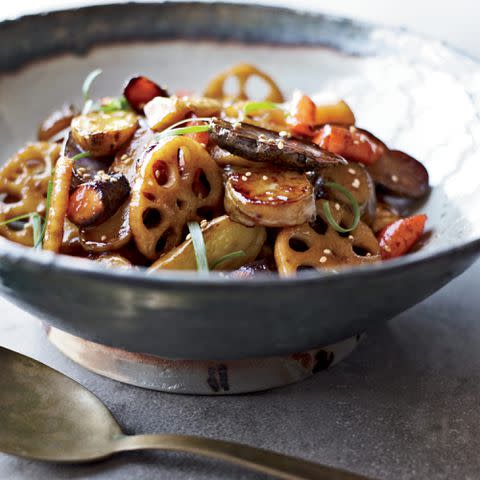
Fresh lotus root, Jerusalem artichokes, carrots, parsnips, and potatoes are glazed in maple syrup and soy sauce for this quick and easy vegetable side dish.
Roasted Winter Squash with Vanilla Butter

This roasted squash medley draped in vanilla bean, butter, and sage features kabocha, Delicata, and Red Kuri squash, though you can use whatever you can find locally.
Yu Choy with Garlic Sauce

Greg DuPree / Food Styling by Chelsea Zimmer / Prop Styling by Julia Bayless
It's very common to order the "vegetable of the day with oyster sauce" at a Chinese meal, and often, yu choy is what arrives. Yu choy is a large leafy green vegetable with a tender stalk that tastes like a mix between asparagus and spinach. Here, it gets dressed with classic oyster sauce, as well as toasted sesame oil, rice vinegar, garlic, ginger, and Fresno chile.
Steamed Fish with Soy Broth

A whole steamed fish with soy, ginger, and scallions is commonly ordered at a Chinese banquet or family gathering. For ease, this recipe calls for fish fillets, which are enhanced by umami-forward Fortified Soy Sauce made from bonito flakes, dark soy sauce, nutritional yeast, sake, mirin, and kombu.
Sweet Potato Mushroom Salad

Japanese white sweet potatoes and mushrooms are dressed with a mustard-miso sauce and served warm in this easy side dish.
Whole Fish with Ginger Scallion Oil
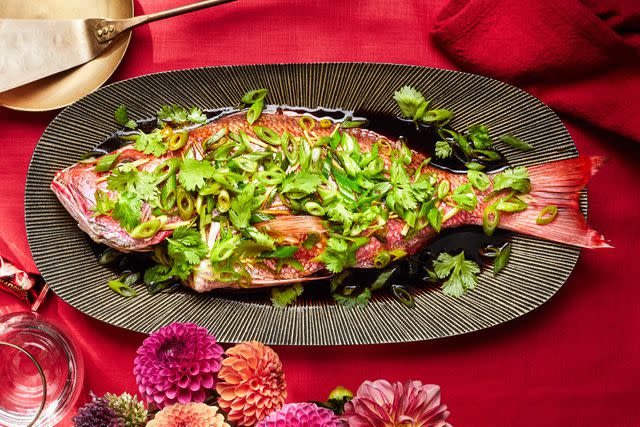
Light soy sauce, Shaoxing wine, ginger, and scallions are all you need for steaming this whole fish. Search out the freshest fish you can find — it makes all the difference.
Mushroom Fricassee

Three types of mushrooms — cremini, hen-of-the woods, and chanterelles — soak up a Champagne vinegar and thyme dressing after a hot roast in the oven. This recipe is ideal for making ahead as the mushrooms need at least two hours to soak in the dressing before serving.
For more Food & Wine news, make sure to sign up for our newsletter!
Read the original article on Food & Wine.


